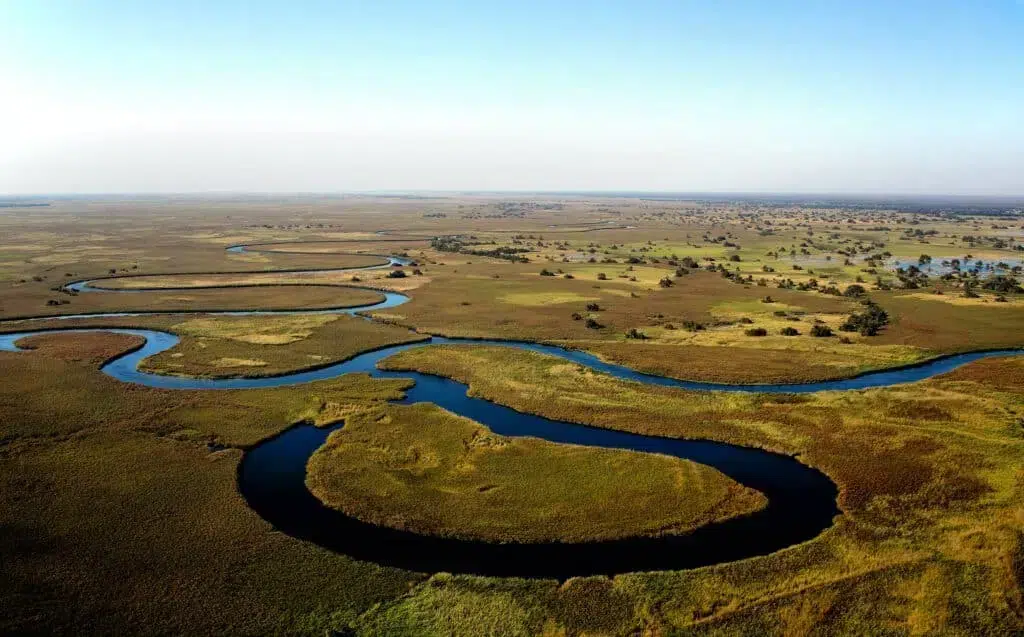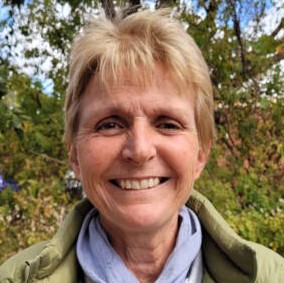An Uncertain Future for the Okavango

Increasingly damaging developments across Africa are threatening the continent’s rich biodiversity.
By Lewis Kihumba
Lying in Southern Africa, the Okavango Delta is the continent’s largest inland delta, covering an area of over two million hectares that straddles three countries –Botswana, Namibia, and Angola. The delta is home to more than 480 bird species, many of which are of conservation concern, including six species of Vultures, the Southern Ground-Hornbill, Slaty Egret, and the Wattled Crane. Furthermore, the delta is home to an impressive 130 mammal species in addition to numerous reptiles, fish, and plant species. Given that Botswana supports the world’s largest elephant population, numbering around 130,000, the delta is a core area for the survival of this iconic species.
The Botswana component of the Okavango is thus well-deserving of its UNESCO World Heritage status, having been inscribed in 2014. It has also been designated as a Wetland of International Importance under the Ramsar Convention. It follows that this area is not only of national, but also regional and international importance. It is vital for conserving biological diversity and, as a key watershed, is critical to the survival of communities living in the delta.
However, despite its rich diversity and importance to local communities, in January 2021 the Canadian oil and gas firm Reconnaissance Energy Africa (ReconAfrica) began drilling test wells for oil after acquiring a license to explore 35,000km2 in the Kavango Basin in Northeastern Namibia and northwestern Botswana which ReconAfrica claims could hold up to up to 31 billion barrels of crude oil.
Environmental Violations
Since the drilling started in Namibia in January 2021, ReconAfrica has not found any commercially exploitable oil reserves. However, concerns have been raised with respect to the quality of the Environmental Impact Assessments (EIAs) conducted before undertaking the exploration efforts, with the company also attracting heavy criticism for its failure to implement appropriate impact mitigation measures. Effective participation of stakeholders, notably Indigenous and local communities, has also been inadequate. It is pertinent to note that the drilling is taking place in environmentally sensitive areas and that it is potentially the first step towards extractive activities that would pose significant risks to World Heritage Sites in Botswana – including the interconnected water system of the Okavango Delta. In light of the climate change crisis, oil exploration at a site so crucial for nature makes no sense.
“Tourism is the second largest revenue-generator for Botswana after diamond mining. Allowing oil drilling in the Delta, which could lead to oil extraction and its attendant pollution is akin to cutting off a nation’s hand”, said Motshereganyi Virat Kootsositse, CEO of BirdLife Botswana.
The World Heritage Committee has also made several pronouncements that oil and gas exploration and exploitation are incompatible with World Heritage status, calling upon Parties to make every effort to ensure that extractive companies located in their territory cause no damage to World Heritage properties. The Committee has expressed concern about the potential negative impact of ReconAfrica’s activities on the Okavango Delta in case of spills or pollution and has urged that this project’s next steps be subject to rigorous and critical prior review.
In 2021, BirdLife Partners in Southern Africa published a joint media statement ahead of the 44th session of the World Heritage Committee, voicing their concerns over the threats facing key World Heritage Sites in the region. This included the potentially significant detrimental impacts of the extractive industry on the Okavango Delta. Following this, in November 2022, all 26 BirdLife Africa Partners signed a Joint Statement on the development threats affecting World Heritage Sites, including the Okavango. This was shared with the World Heritage Centre, World Heritage Committee and relevant agencies on the 50th Anniversary of the UNESCO World Heritage Convention’s adoption.
“African BirdLife Partners reiterate the concerns expressed in their Joint Statement to members of the UNESCO World Heritage Committee and representatives of the World Heritage Centre on the 50th anniversary of the adoption of the World Heritage Convention in November 2022. We emphasize the need for ESIA/EIA processes to be transparent and participatory and for stakeholders` inputs to be meaningfully considered and addressed,” said Julia Pierini, CEO BirdLife Zimbabwe, and Chair of the BirdLife International Council for the African Partnership (CAP).
“In the matter of the Okavango Delta, there are serious concerns about the transparency of the process, the adequacy of the EIA and the potential to impact the Delta’s Outstanding Universal Value (OUV). On the eve of Africa World Heritage Day on 5th May 2023, we implore Party States to value and do their utmost to protect and conserve our region`s unique natural heritage”, she further added.
African World Heritage Day was proclaimed by the General Conference of UNESCO in 2015 and has since been celebrated annually to increase global awareness of African natural and cultural heritage. It provides an important opportunity to reflect on the benefits of protecting Africa’s irreplaceable heritage, the threats this heritage faces, and the steps that need to be taken to preserve the Outstanding Universal Value of African World Heritage Sites for both current and future generations.
ReconAfrica has been increasingly accused of flagrant environmental violations and flouting laws. Namibia is home to more than 80 community conservancies which cover approximately 20% of the country’s area, where local communities are empowered to manage natural resources. In 2021, National Geographic reported that ReconAfrica had bulldozed a forest area and blatantly proceeded to illegally drill inside the Kapinga Kamwalye Community Conservancy, which was established to protect elephants, hippos, and Grey Crowned Cranes among other species. This drilling was conducted without consulting the local community land board as stipulated by law.
Last year, the Namibian government extended the company’s exploratory drilling licences to 2025, a move met with a huge outcry from conservation groups. Consequently, four forestry associations and community committees launched an appeal to the Minister of Environment, Forestry and Tourism, calling for the decision to be reviewed or rescinded. With no response to this appeal, the group filed an urgent court action, which was unsuccessful. More recently, however, the Minister finally agreed to hear the appeal, along with an appeal by the Economic and Social Justice Trust. These appeals were heard on 24 April 2023, with the Minister expected to soon deliver his findings.
“Oil exploration in an ecosystem as important as the iconic Okavango Delta is extremely worrying, particularly at a time when commitment to new exploration should stop in search of more sustainable sources of energy. While the world grapples with both the biodiversity and climate crises, it’s crucial that we protect these sites and look for more creative ways to produce energy. This needs to be done not only thinking about nature and climate, but involving local communities closely so they too are too part of the decision making and the solution”, said Patricia Zurita, CEO of BirdLife International.
An international campaign, launched in 2021, has called for a full moratorium on oil and gas development in the Okavango River Basin. International organizations including Re:wild and BirdLife, together with environmental activists, have also called for the upholding of community rights as local communities continue to pursue legal redress from the threat of the oil exploration in the Okavango. In addition to the Minister’s decision on their appeal, communities are currently awaiting a decision from the Namibian High Court regarding whether they should foot the bill for government’s legal fees after their unsuccessful court action in 2022. A new ruling date for the latter has been set for May 2023.
As the battle for the soul of the Okavango continues, local communities and civil society organisations demand that the activities of ReconAfrica be immediately stopped, and due process followed. We also appeal that the Government of Namibia does the right thing so that the Okavango continues to provide essential ecosystem services for this and future generations.
Header Image: Aerial Shot of Okavango Delta © Wynand Uys

“In the matter of the Okavango Delta, there are serious concerns about the transparency of the process, the adequacy of the EIA and the potential to impact the Delta’s Outstanding Universal Value”
Julia Pierini, CEO BirdLife Zimbabwe, and Chair of the BirdLife International Council for the African Partnership (CAP)